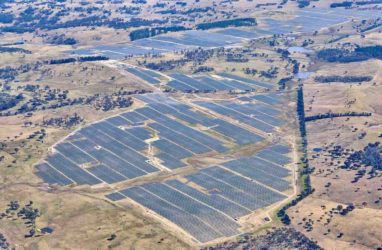Feed aggregator
Energy Insiders Podcast: Chris Bowen on gas, batteries, EVs, wind and targets
 Federal Energy and Climate Minister Chris Bowen discusses the stream of new announcements in the last month, and what’s in store for 2023.
Federal Energy and Climate Minister Chris Bowen discusses the stream of new announcements in the last month, and what’s in store for 2023.
The post Energy Insiders Podcast: Chris Bowen on gas, batteries, EVs, wind and targets appeared first on RenewEconomy.
Chris Bowen: Gas is neither a transition fuel, nor low emissions. But at least it’s flexible
 Chris Bowen dismisses gas as transition fuel, says focus is on batteries and pumped hydro. And he discusses major new legislation on capacity, EVs, safeguards and climate targets.
Chris Bowen dismisses gas as transition fuel, says focus is on batteries and pumped hydro. And he discusses major new legislation on capacity, EVs, safeguards and climate targets.
The post Chris Bowen: Gas is neither a transition fuel, nor low emissions. But at least it’s flexible appeared first on RenewEconomy.
Rooftop solar takes biggest bite yet out of brown coal’s Christmas lunch
 Victoria's grid has recorded a new operational demand low thanks to solar power generated on rooftops.
Victoria's grid has recorded a new operational demand low thanks to solar power generated on rooftops.
The post Rooftop solar takes biggest bite yet out of brown coal’s Christmas lunch appeared first on RenewEconomy.
The historic COP15 outcome is an imperfect game-changer for saving nature. Here's why Australia did us proud
Countries set to upgrade High Ambition Coalition to work on GBF implementation
Bowen takes first step to put environment back into energy market rules
 The Albanese government launches consultation on putting emissions reductions into the objectives of the national energy laws, a long-overdue reform.
The Albanese government launches consultation on putting emissions reductions into the objectives of the national energy laws, a long-overdue reform.
The post Bowen takes first step to put environment back into energy market rules appeared first on RenewEconomy.
Fortescue signs deal to produce hydrogen-fuelled green steel
 Fortescue signs another MoU to produce green steel on a commercial scale without burning fossil fuels.
Fortescue signs another MoU to produce green steel on a commercial scale without burning fossil fuels.
The post Fortescue signs deal to produce hydrogen-fuelled green steel appeared first on RenewEconomy.
Poachers target hippos for giant teeth in place of ivory
Met Office forecasts 2023 will be hotter than 2022
'The 1.5-degree goal is gasping for breath': António Guterres on the state of climate action – video
UN secretary general, António Guterres, during his final press conference this year said, 'This is not a time to sit on the side-lines, it is a time for resolve, determination, and – yes – even hope.' Speaking to journalists in New York, Guterres said, 'Despite the limitations and long odds, we are working to push back against despair, to fight back against disillusion and to find real solutions.' Despite his outlook on global heating, one positive development, he pointed out, was that on Monday at 3am, 'delegates at the Cop15 UN biodiversity conference in Montreal agreed on a new global biodiversity framework'
- Climate goal of 1.5C is ‘gasping for breath’, says UN head
- The Guardian view on the Cop15 agreement: nations must do more for nature
New York committee recommends cap-and-invest programme in final climate strategy
Two more African nations ready themselves for international carbon trading
EU lawmakers warn that ETS reform “breathing space” won’t last
CEFC jumps back into solar market as cost hikes put 82 pct renewable target at risk
 CEFC makes biggest project finance deal for large scale solar as it seeks to help renewables overcome economic headwinds
CEFC makes biggest project finance deal for large scale solar as it seeks to help renewables overcome economic headwinds
The post CEFC jumps back into solar market as cost hikes put 82 pct renewable target at risk appeared first on RenewEconomy.
‘We didn’t accept it’: DRC minister laments forcing through of Cop15 deal
Democratic Republic of the Congo’s environment minister says country has not agreed to ‘30 by 30’ deal
The Democratic Republic of the Congo’s environment minister has said her country has not agreed to a deal to halt the destruction of the Earth’s ecosystems, prompting behind-the-scenes diplomatic efforts to keep the agreement alive just hours after it was adopted.
Ève Bazaiba, the DRC’s environment minister, said her country would be writing to the UN secretary general, António Guterres, and the Convention on Biological Diversity to express the DRC’s position on the final text. It comes after the Chinese Cop15 president, Huang Runqiu, appeared to force through the agreement in the final plenary just moments after the DRC negotiator had said did not support the deal, which is typically negotiated by consensus. His interventions prompted further objections from Uganda and Cameroon.
Continue reading...The Guardian view on the Cop15 agreement: nations must do more for nature | Editorial
International cooperation is the only way to halt biodiversity losses. But the action promised so far isn’t enough
The 23 targets in the Cop15 biodiversity agreement announced in Montreal on Monday are insufficient to prevent further irrecoverable losses, including among the many species threatened with extinction. The deal is not legally binding, leading to concerns about the prospects for implementation. The track record of global biodiversity plans is terrible. Every one of 20 targets set at Aichi in Japan in 2010 was missed.
The new agreement was finalised despite complaints from African countries including the Democratic Republic of the Congo (DRC), home to one of the world’s largest rainforests, which is threatened by oil and gas exploration. The description of the US’s role as “an interesting asterisk” by the Canadian prime minister, Justin Trudeau, was too mild. It is shaming and alarming that the US was at the talks as an “influencer” and not a participant, because the Senate has refused to ratify the UN convention on biological diversity.
Continue reading...How closely monitoring households' energy data can unleash their solar outputs and (possibly) make them more money
Some of world’s largest banks gear up for scaling of voluntary carbon market with new transaction network
EU agrees on temporary mechanism to limit excessive gas prices
Dolphins may suffer from Alzheimer’s disease, say researchers in Scotland
Bottlenose dolphin, a long-finned pilot whale and a third species found to have markers of the degenerative disease
Three species of cetacean stranded off the coast of Scotland, including a bottlenose dolphin and a long-finned pilot whale, have been found to have the classic markers of Alzheimer’s disease, according to a study.
Although types of dementia have been fairly widely detected in other animals, Alzheimer’s disease has not been found to occur naturally in species other than humans.
Continue reading...


